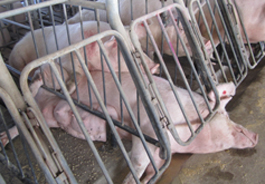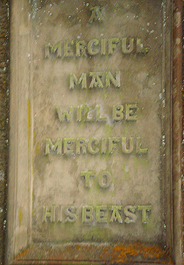Factory Farming and Welfare-Minded Veterinary Professionals
What We Can Learn from Tim Tebow and Don Quixote
by Jon Geller, DVM, DABVP, CVPM, CVJ
November 5, 2012
 Does the veterinary profession assess welfare of food animals differently than that of companion animals? Would veterinarians agree that living conditions such as the ones breeding female pigs are often housed in are acceptable for dogs, cats, or rabbits? The HSUSWhen New York Jets quarterback Tim Tebow kneels to pray publicly at the end of a football game, and when the mythical Don Quixote foolishly attacks windmills to protect fair Dulcinea, they both endure ridicule and the scorn of others. However, their courage to act in accordance with their convictions is great enough to overcome any disdain directed their way.
Are we welfare-minded veterinary professionals equally brave?
The issue of animal welfare in factory farming has been explored extensively, and it would appear that the majority of welfare-minded veterinarians seem opposed to it. Raymond Tarpley, DVM, PhD, MPH, of the Institute for Global Health and Health Policy in College Station, Texas addressed the issue in a recent letter to the editor in JAVMA1. He points out that as a veterinary profession we use different criteria for assessing the welfare of food animals than that of companion animals. He concludes that, “Unless we as a profession are resigned to a dual-value system, we must continue to work to design a competitive production environment in which those standards to which we as a profession subscribe can be met.”1
The subscription Dr. Tarpley refers to is, no doubt, the Veterinarian’s Oath. It reads:
Being admitted to the profession of veterinary medicine, I solemnly swear to use my scientific knowledge and skills for the benefit of society through the protection of animal health and welfare, the prevention and relief of animal suffering, the conservation of animal resources, the promotion of public health, and the advancement of medical knowledge.
I will practice my profession conscientiously, with dignity, and in keeping with the principles of veterinary medical ethics. I accept as a lifelong obligation the continual improvement of my professional knowledge and competence.
There is nothing in this oath that justifies compromising animal welfare—be it that of food animals, or any other animals. Indeed, we may all agree that the promotion of public health might best be served by producing food animals that are raised free of crowding, stress, antimicrobials, and other growth-promoting practices.
The economics of the industrial production of animal protein is a complex topic that is beyond the scope of this article. The point can be made, however, that the cost of a pound of beef, pork, chicken, or a dozen eggs is not the primary concern of the veterinarian. Rather, the welfare and health of the animals yielding that protein is our primary concern, as well as the food safety and public health of consumers.
Veterinarians have the ability to affect powerful change simply through our daily decisions. Dramatic solutions involving activism, demonstrations, and speeches are not required. Lengthy and complex legislation to affect change is not necessary either, but all of these efforts can certainly help to move our society in the right direction.
Veterinarians only need to make daily decisions consistent with our own beliefs in order to have a potentially profound effect on the way food animals are currently produced in the U.S. Three times a day or more we choose what to eat, we shop for groceries, or we may dine out. Our choices—in so far as they are in line with our beliefs—are promises to ourselves that we keep.
 An engraved plaque mounted on the wall of an ancient Gate House in Scotland. Dr. Jon GellerBoycotting factory farming is a personal and powerful action that sends a message to restaurateurs, grocers, fast food franchise owners and everyone else involved in putting animal protein on the table. It sends the clear concise message that we will not purchase or consume meat, eggs or poultry that has been raised under factory-farm conditions. No explanation is necessary; the simple act of putting certain foodstuffs in your grocery cart or making specific selections from a menu sends this message.
Of course, putting forward a positive strategy is equally important, and that means supporting producers, grocers, and restaurants that offer alternatives to factory-farmed protein. Switching to better options—such as switching from battery cage eggs to eggs from cage-free hens and meat from factory farms to meat from pasture-raised animals—is more consistent with our commitment to animal health and welfare, the relief of animal suffering, and the promotion of public health.
These choices often entail an economic consequence in the form of higher prices. Are you willing to pay it? They may generate some raised eyebrows or ridicule from family members, friends and colleagues. Are you willing to endure it?
How powerful would welfare-minded veterinary professionals become if we took these steps every day, at every opportunity, together? How many others could we influence by our actions without having to proselytize, cajole, argue, legislate, and educate? These simple actions—like Tim Tebow kneeling in the end zone or Don Quixote charging across the plains of Spain on his horse—send a message and set an example for the rest of the world to hear and to emulate.
 Dr. Jon Geller graduated from Colorado State University College of Veterinary Medicine in 1995, and initially set up a mixed animal mobile practice. In 1999, he began working in small animal emergency medicine, and has set up and managed four emergency clinics in Colorado. He currently works as an emergency veterinarian and hospital director of Veterinary Emergency and Rehabilitation Hospital in Fort Collins, Colo. In 2009, he became certified by the American Board of Veterinary Practitioners. In 2011, he was certified as veterinary journalist by the American Society of Veterinary Journalists, and in 2012 achieved certification as a Certified Veterinary Practice Manager by the Veterinary Hospital Managers Association. He has participated with HSVMA on several international field projects, including helping start a training program for veterinarians in Mexico.
1 Tarpley, Raymond J, JAVMA Vol 241, No.4, August 15, 2012
*The views and opinions expressed in this column are those of the author and do not necessarily reflect the official position of the HSVMA. |